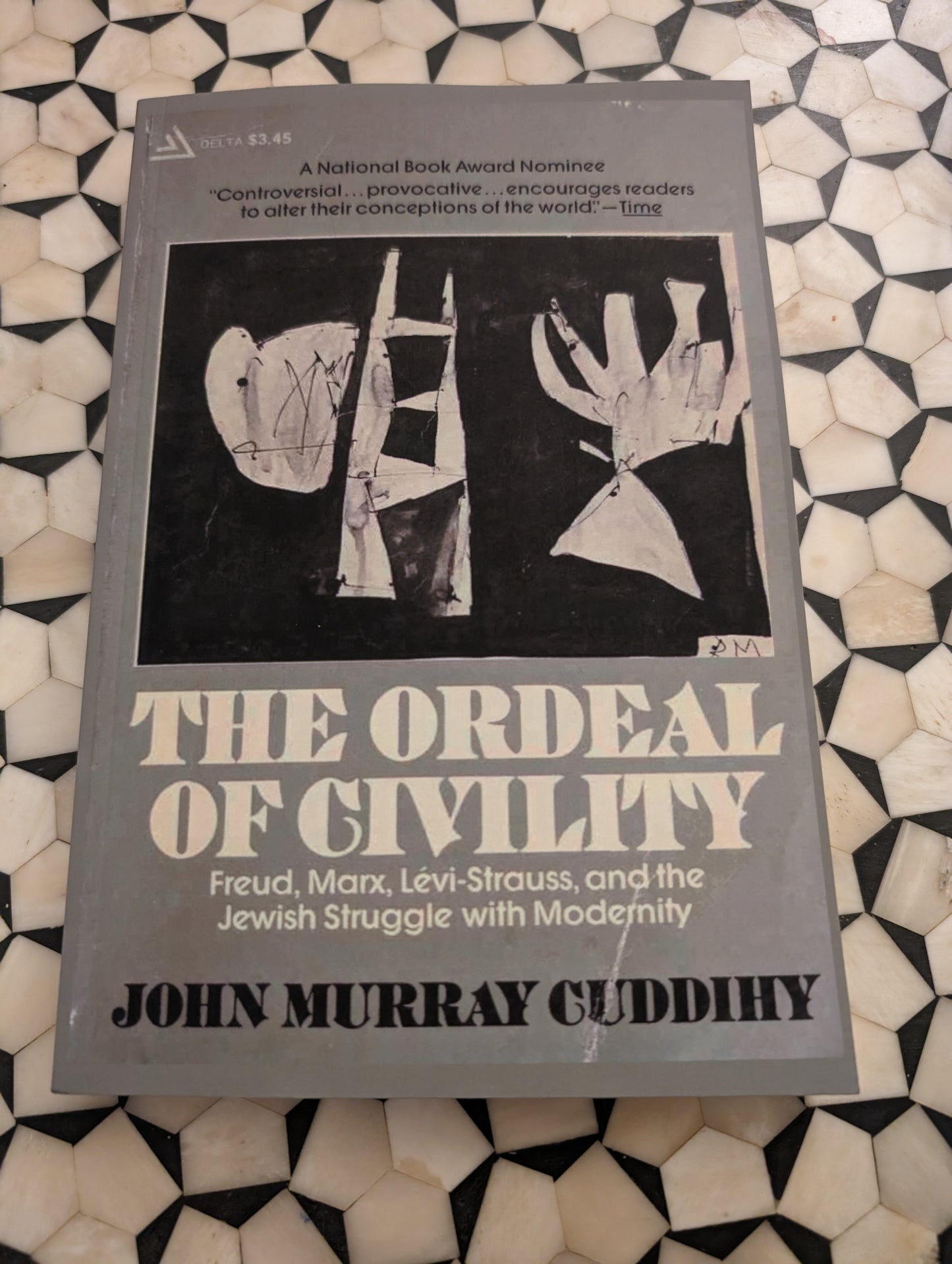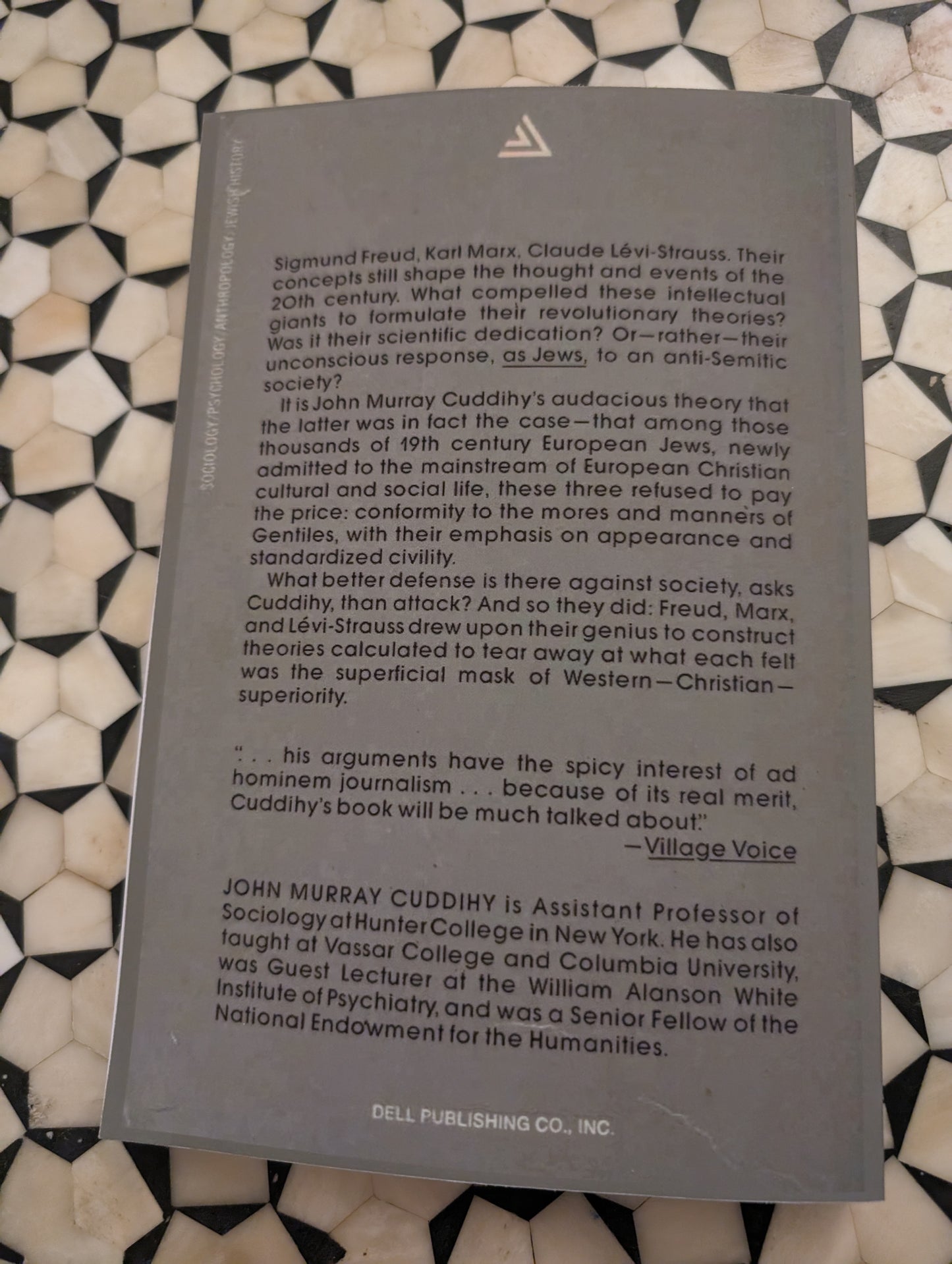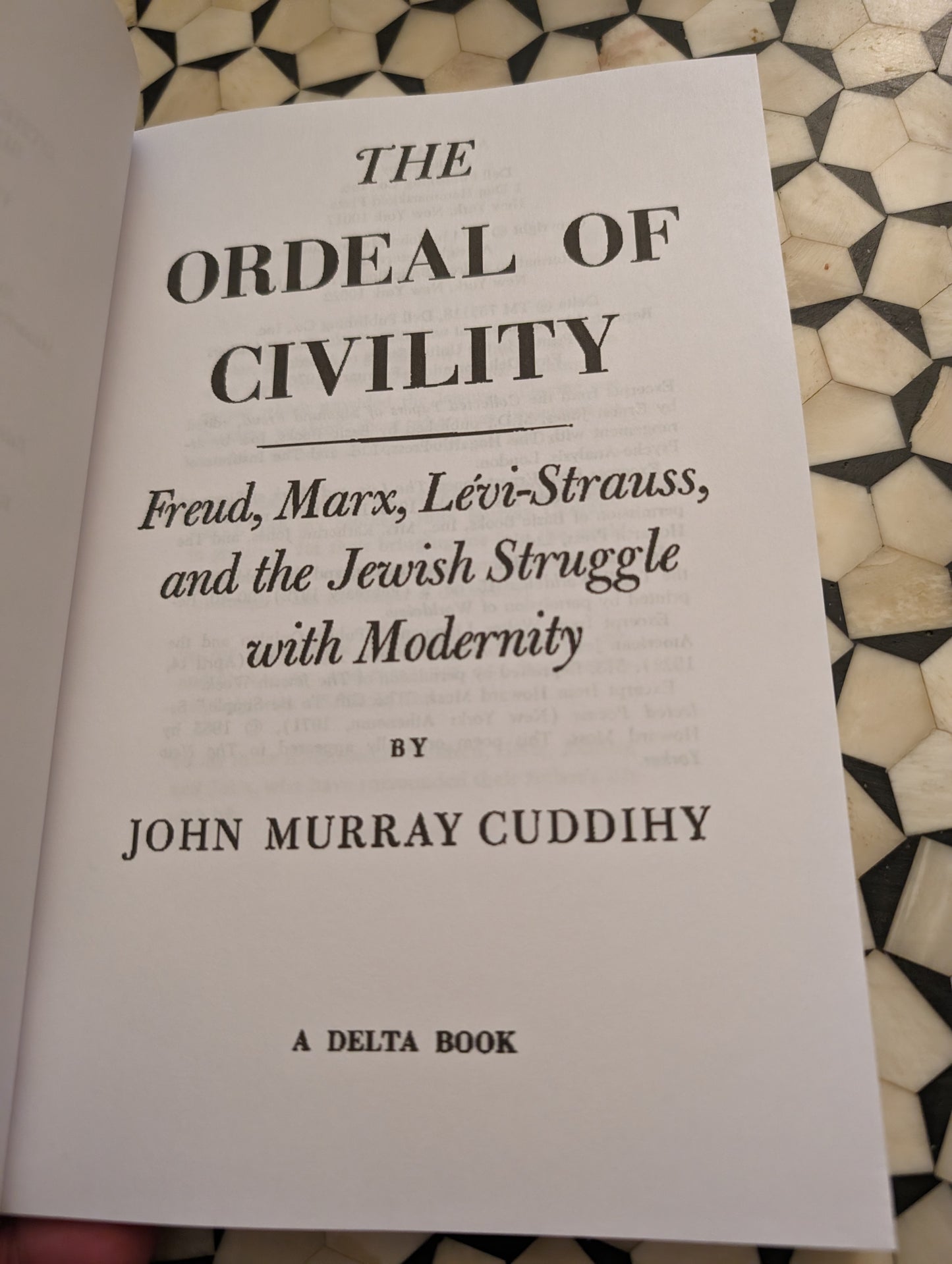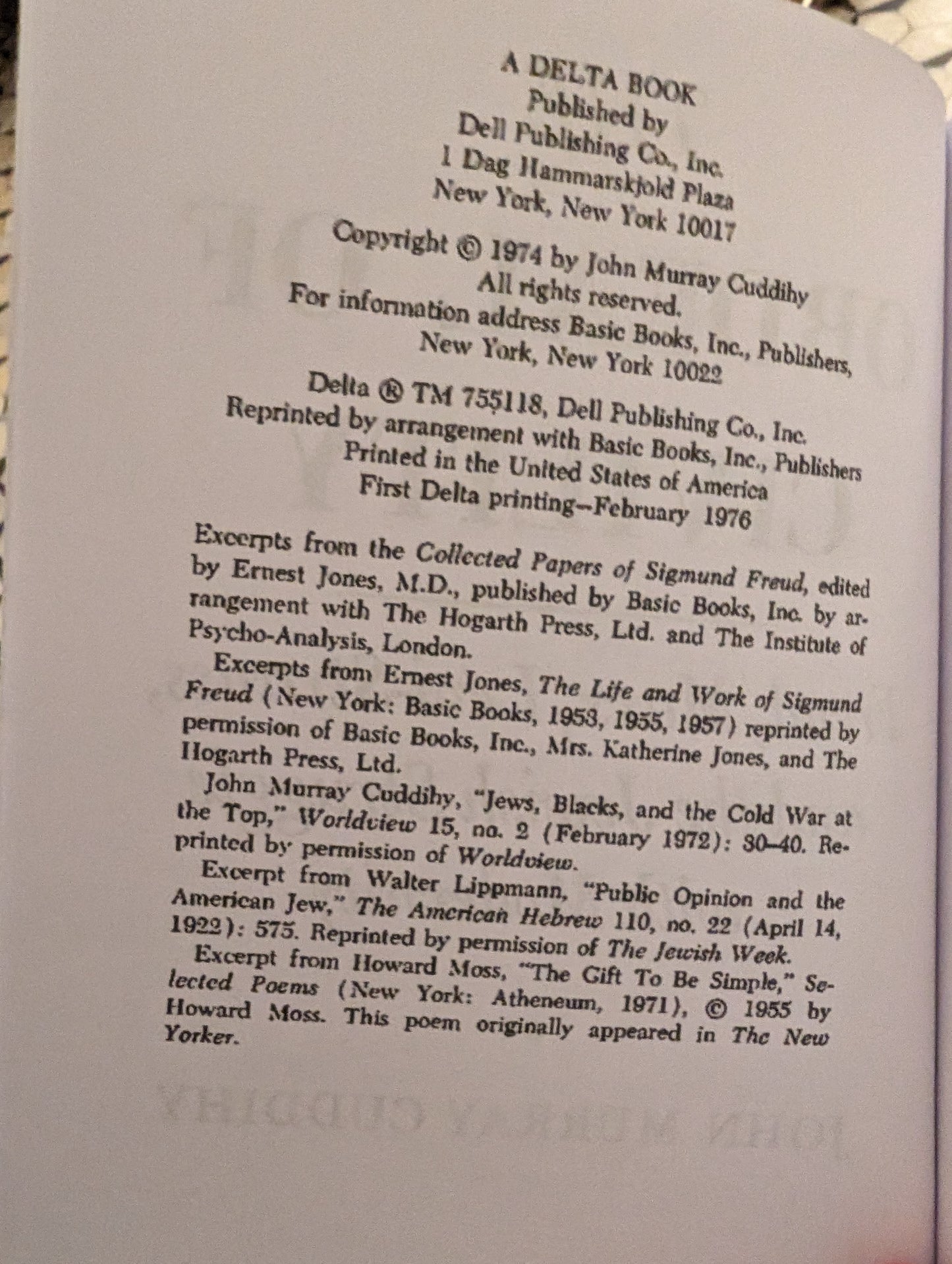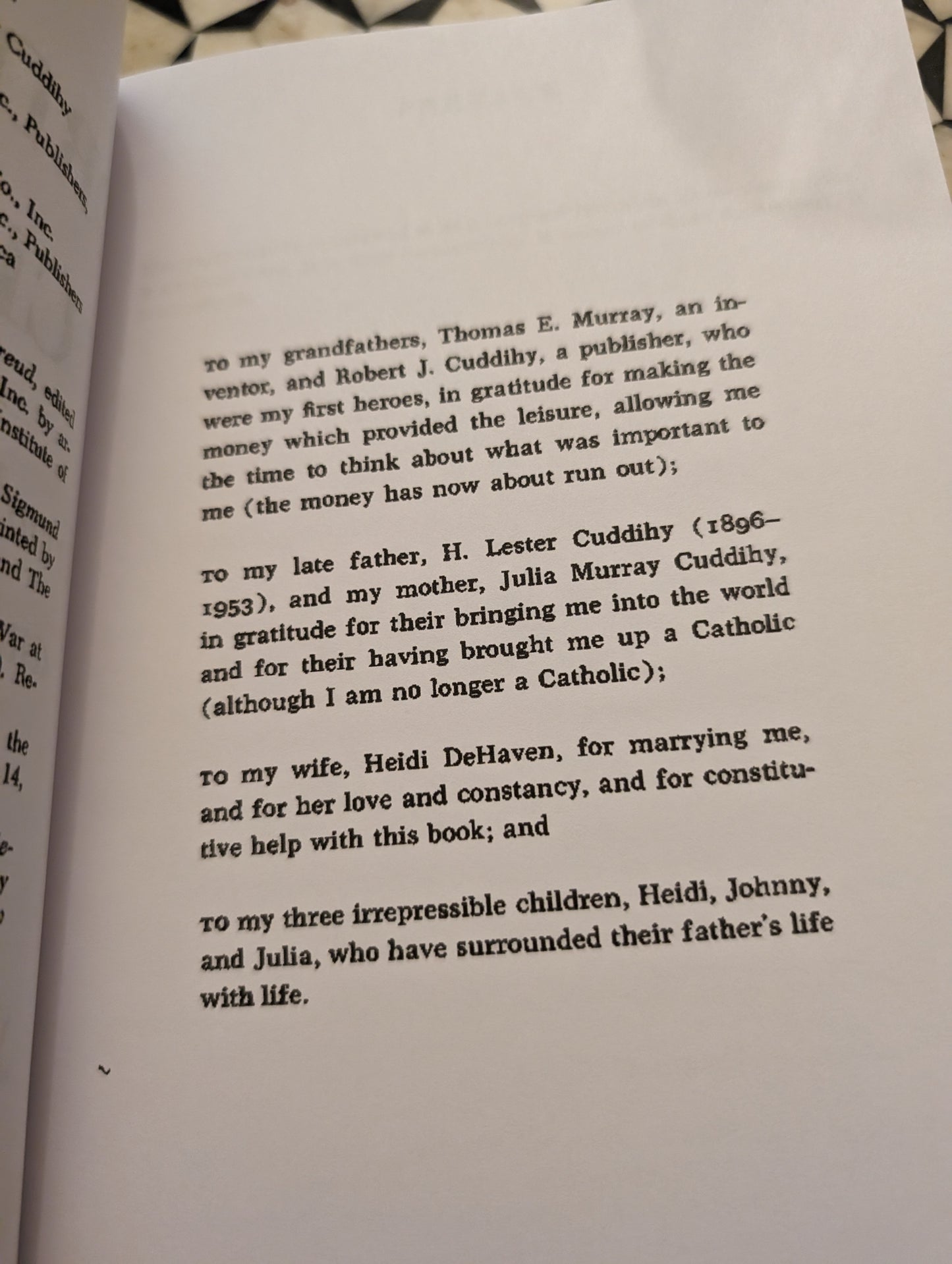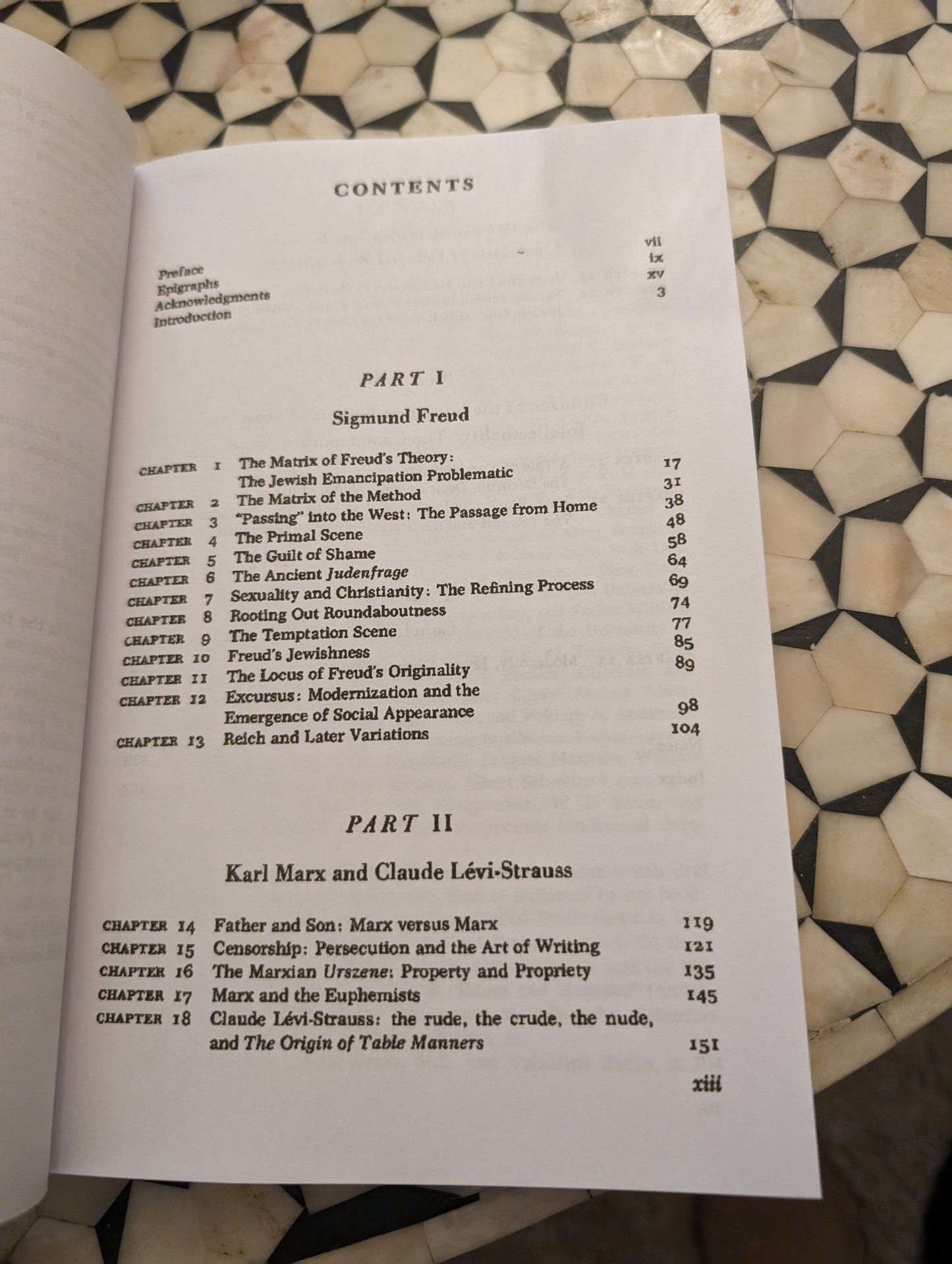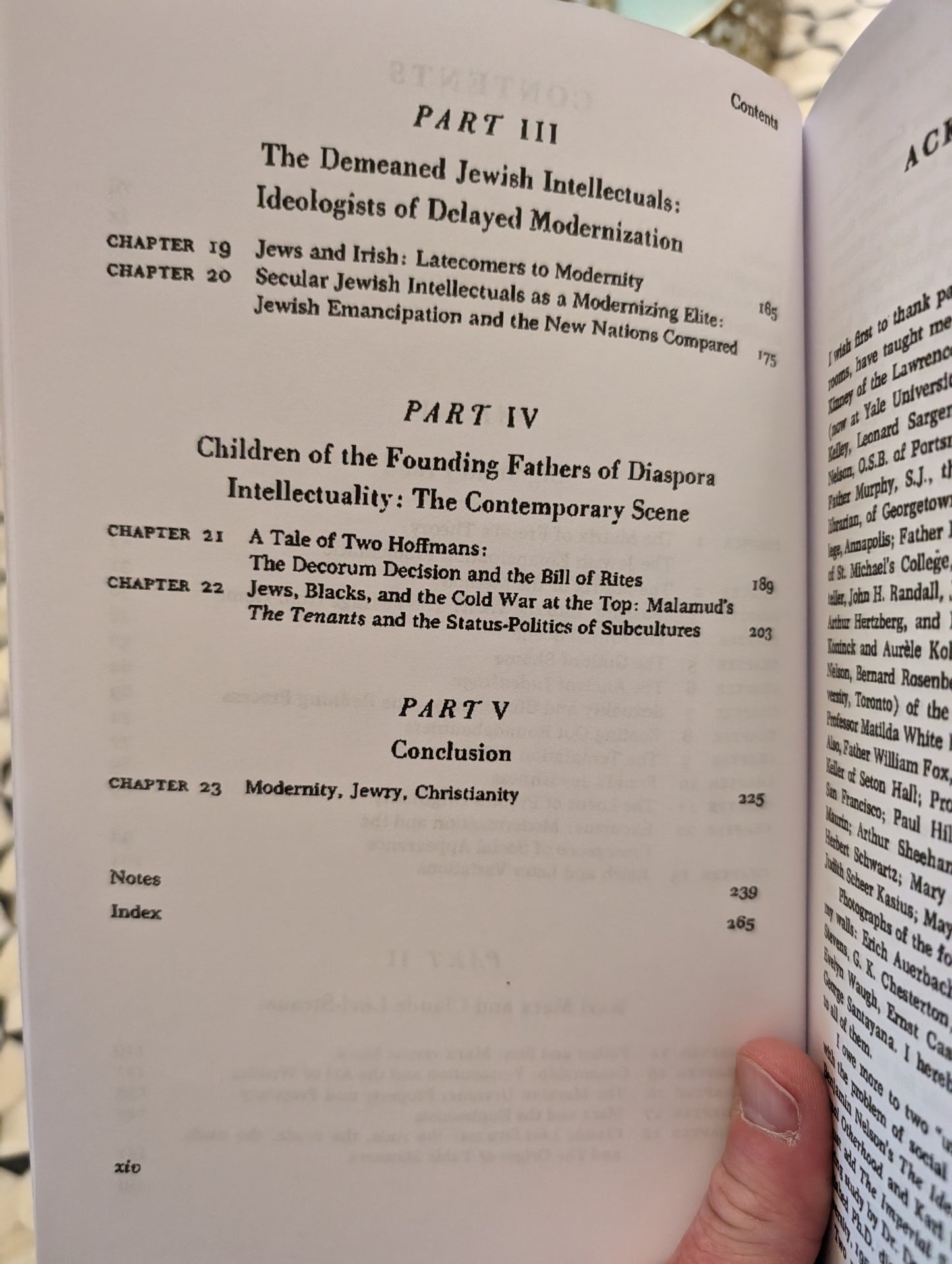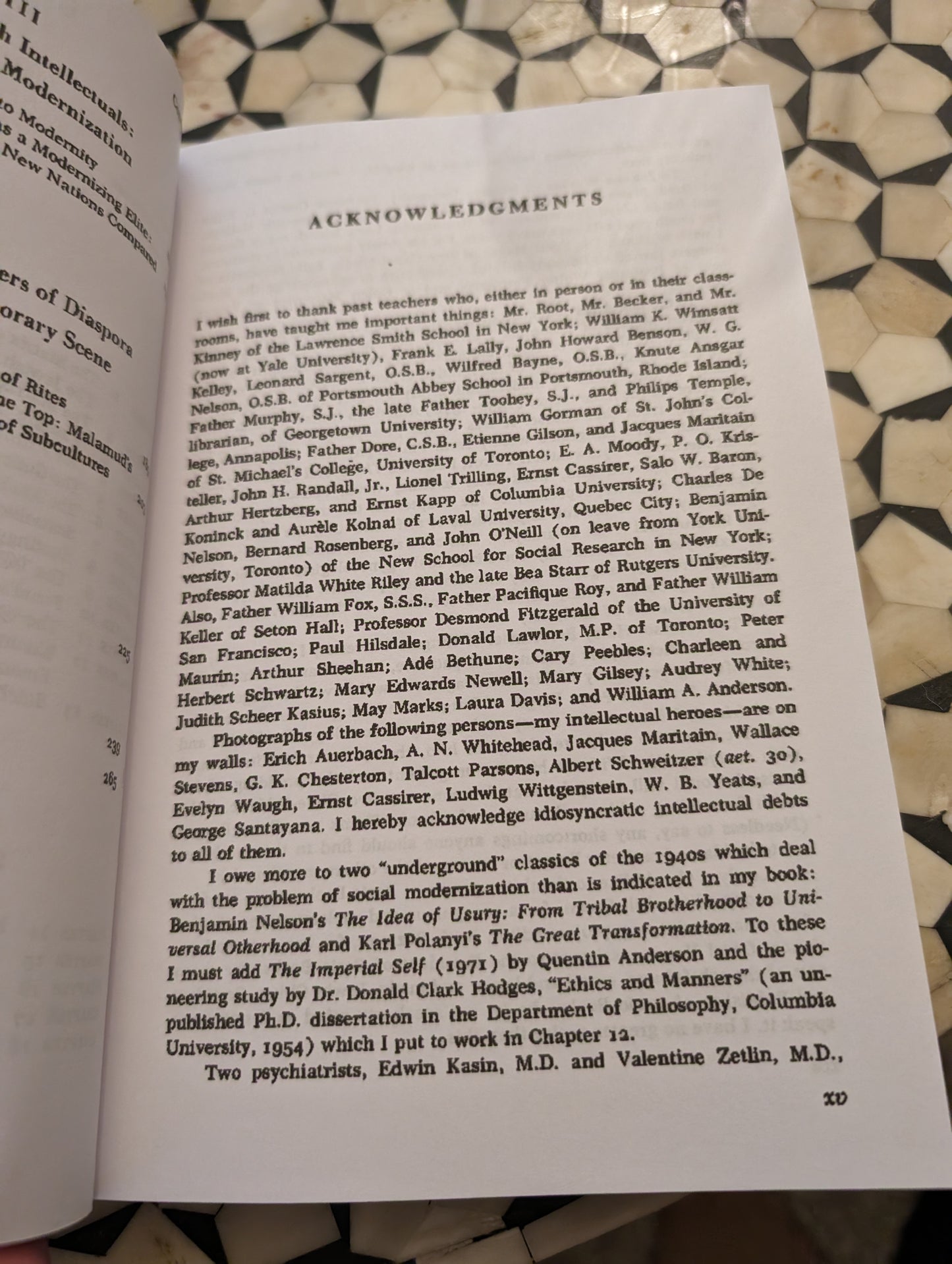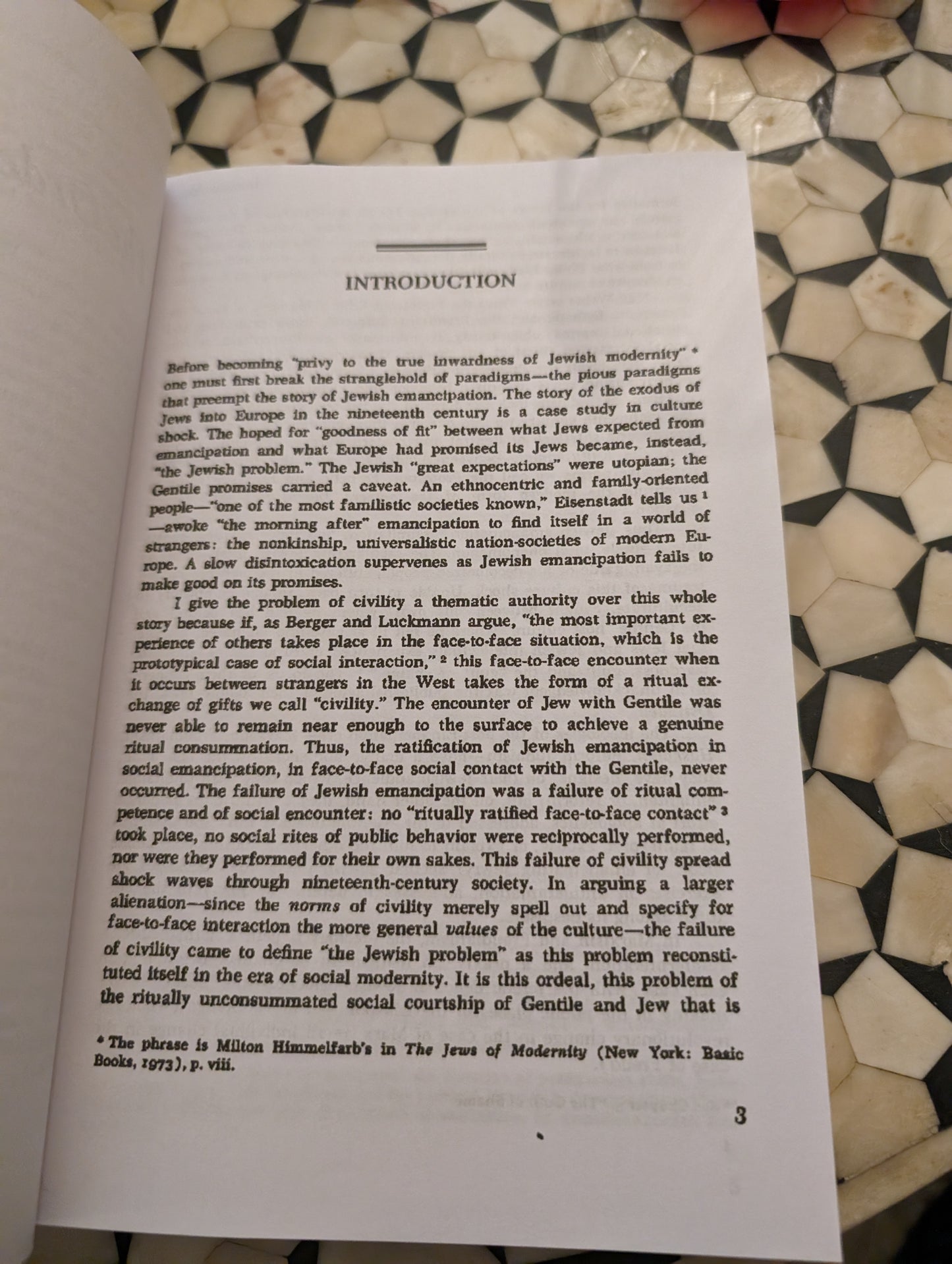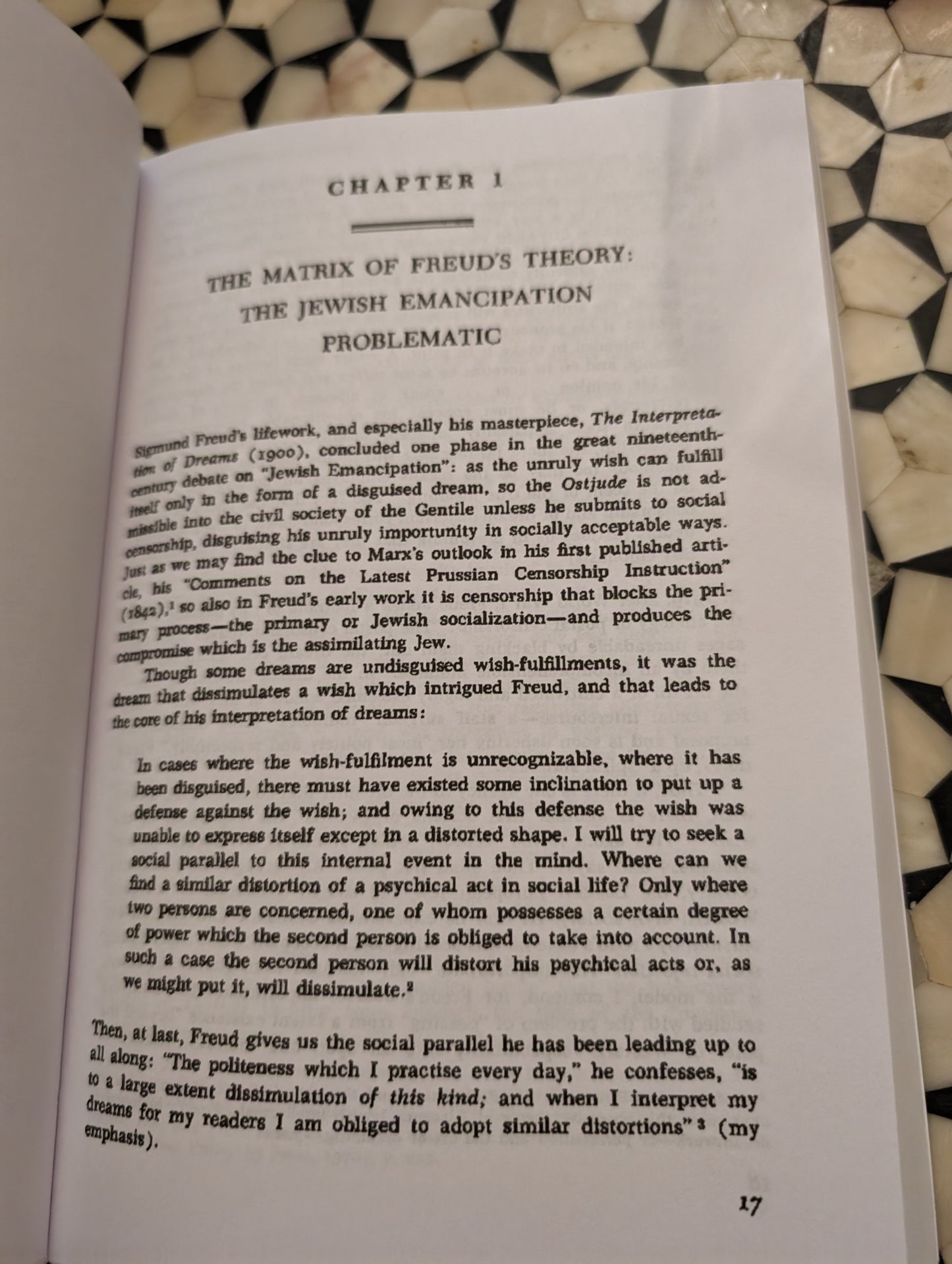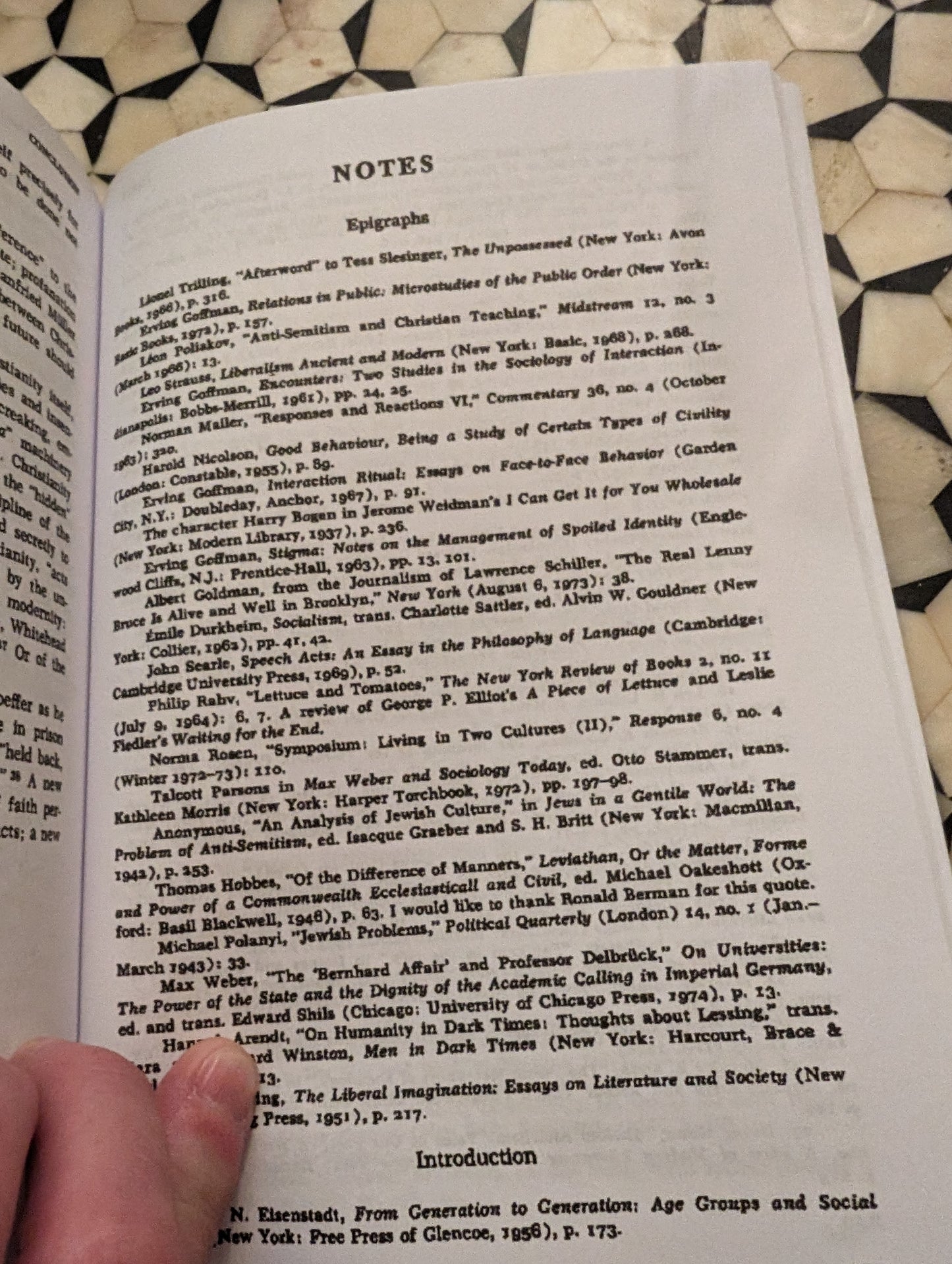1
/
of
11
Obscure Books
The Ordeal of Civility by John Murray Cuddihy
The Ordeal of Civility by John Murray Cuddihy
Regular price
$30.00 USD
Regular price
Sale price
$30.00 USD
Unit price
/
per
Couldn't load pickup availability
This is a paperback facsimile reprint of an exceedingly difficult book to find.
The Ordeal of Civility: Freud, Marx, Levi-Strauss, and the Jewish Struggle With Modernity
The ordeal, says Cuddihy, is the "unconsummated social courtship of Gentile and Jew," focused on the predicament of the Jew, caught between his rough, loving community (Yiddishkeit) and the Gentile "host culture/etiquette" that he wants to assimilate. Cuddihy calls it the trauma of culture shock for a decolonized people. National Book Award finalist (Philosophy), 1975.
From Goodreads:
This book argues that the problem of a people moving from the shtetl into European emancipation was at the core of most Jewish intellectual thought at the dawn of modernity. Becoming modern comes with a price, but for those of Protestant Christian extraction the price is considerably less because modernity is mostly experienced as a secularized form of their own religion. For Catholics there was a small trauma (the separation of Church and State) but for Jews the trauma was much greater, the differences between the old world and the new for more jarring. Even if they did not actually have to attest to Christ as their Lord and Savior in order to be emancipated citizens, Jews from the shtetl had to embrace social norms, values, and practices that effectively made them into cultural copies of Christians whose assimilation they had resisted for centuries. This was the price of admission into modern Western society as full citizens, and it was a steep one.
Cuddihy argues that the fundamental cultural norm of modernity is the politeness with which one must deal with strangers. It is a sense of distance, formality, restraint, and what some, like Freud, might say hypocrisy, that is the expected behavior of a person living in a modern society. As eastern European Jews moved out of the shtetl, where everyone was connected by some degree of social informality by virtue of shared tribal affiliation, into an alienated modern society full of total strangers with whom formality was expected, they encountered great difficulties. We are distant from these debates today, but at the time that Marx, Freud, and Levi-Strauss wrote, the allegation that Jews were uncouth and coarse was one consistently levelled at them by the broader society. There was alleged to be an overfamiliarity and crudeness that Jews out of the shtetl evinced, which they were encouraged to rid themselves of in order to be known as civil, and thus civilized. Defending their people from charges of backwardness, or at least explaining them, was a common task of Jewish intellectuals during this perioid. They did so by acting as spokespeople for their not-yet-civil brethren, but also by dissecting the alleged shortcomings of the prevailing post-Christian culture. Freudianism, Marxism, and Structuralism were in some sense products of this situation.
The suppressed id that Freud wrote about was, according to Cuddihy, actually the suppressed "Yid," who had to deny their true easygoing selves in order to put on a repressed, hypocritical facade for the broader gentile society. In this way, culturally specific problems of double consciousness under assimilation were universalized as part of a general theory of how human beings experience modern Western society. The condemnation, exposition, and often ingenious ridicule of that society was part of a Jewish attempt to ameliorate the pain of their own assimilation into it. Marxism too was an attempt to recreate a seamlessly whole society, like the shtetl, from one that had been carved into individualist pieces, where economy and culture had been painfully separated. The anti-Semitic allegations made against European Jews that they were usurious and economically exploitative were displaced onto his own counter-criticisms that the entire modern society was thus, yet masked it with their hypocritical bourgeoise culture. There was a dual process of radical criticism and compromise, by which Jews gradually changed their mores and beliefs and acculturated themselves into the norms expected by the modern West. These are interesting arguments from Cuddihy, not quite falsifiable, that Freud and others were using their philosophies as ways of dealing with their own angst over assimilation. I think it's true regardless that no one can totally be divorced from the influence of their background, intellectuals included.
Cuddihy argues that the fundamental cultural norm of modernity is the politeness with which one must deal with strangers. It is a sense of distance, formality, restraint, and what some, like Freud, might say hypocrisy, that is the expected behavior of a person living in a modern society. As eastern European Jews moved out of the shtetl, where everyone was connected by some degree of social informality by virtue of shared tribal affiliation, into an alienated modern society full of total strangers with whom formality was expected, they encountered great difficulties. We are distant from these debates today, but at the time that Marx, Freud, and Levi-Strauss wrote, the allegation that Jews were uncouth and coarse was one consistently levelled at them by the broader society. There was alleged to be an overfamiliarity and crudeness that Jews out of the shtetl evinced, which they were encouraged to rid themselves of in order to be known as civil, and thus civilized. Defending their people from charges of backwardness, or at least explaining them, was a common task of Jewish intellectuals during this perioid. They did so by acting as spokespeople for their not-yet-civil brethren, but also by dissecting the alleged shortcomings of the prevailing post-Christian culture. Freudianism, Marxism, and Structuralism were in some sense products of this situation.
The suppressed id that Freud wrote about was, according to Cuddihy, actually the suppressed "Yid," who had to deny their true easygoing selves in order to put on a repressed, hypocritical facade for the broader gentile society. In this way, culturally specific problems of double consciousness under assimilation were universalized as part of a general theory of how human beings experience modern Western society. The condemnation, exposition, and often ingenious ridicule of that society was part of a Jewish attempt to ameliorate the pain of their own assimilation into it. Marxism too was an attempt to recreate a seamlessly whole society, like the shtetl, from one that had been carved into individualist pieces, where economy and culture had been painfully separated. The anti-Semitic allegations made against European Jews that they were usurious and economically exploitative were displaced onto his own counter-criticisms that the entire modern society was thus, yet masked it with their hypocritical bourgeoise culture. There was a dual process of radical criticism and compromise, by which Jews gradually changed their mores and beliefs and acculturated themselves into the norms expected by the modern West. These are interesting arguments from Cuddihy, not quite falsifiable, that Freud and others were using their philosophies as ways of dealing with their own angst over assimilation. I think it's true regardless that no one can totally be divorced from the influence of their background, intellectuals included.
Share
